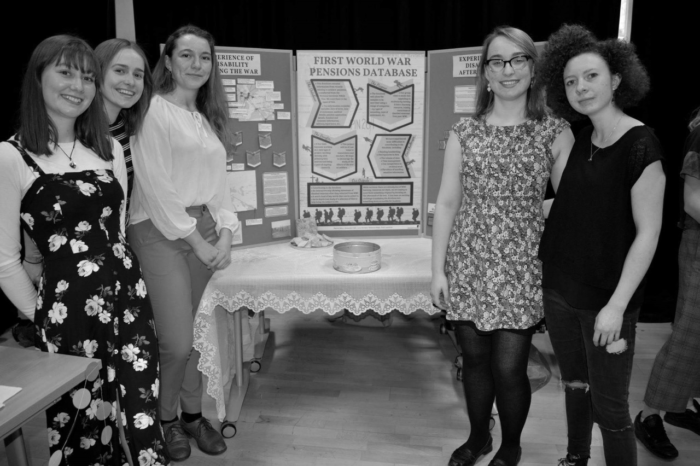Research Reflections: An Undergraduate's Perspective
Written by Rachel Berry
This past year, five undergraduate students, including myself, joined the Men, Women and Care project as part of FOAR2000, a research placement module. Being from a variety of academic backgrounds (History, Sociology, and English), we each were excited to be a part of the project for different reasons, but ultimately we were all thrilled to be able to look at the details of real life veterans on a more personal level than other modules allow, through looking at the primary sources of the PIN 26 files. Our role in the project was to both contribute to transferring files from the National Archives to the online database, and to create our own output of our choosing related to the project.
At first, the Men Women and Care project seemed very intimidating to us; the PIN 26 files were huge, we did not have much knowledge about disability and veterans, and we only had a year to make a significant impact into the project. Initial attempts to read the files and input the information into the database were very slow and difficult. The handwriting was unintelligible, each file was seemingly endless, and we struggled to figure out which parts of their files were relevant. Thankfully, weekly meetings with Jessica and Alexia were our saving grace; they could instantly decipher locations and medical conditions from the squiggly lines that left us baffled! They provided us with books to fill the gaps in our knowledge, and convinced us that they too found the database overwhelming at times. We learnt that dedicating blocks of time to delve into the files, instead of popping in and out of them, allowed us to become more familiar with the non-chronological, messy and tedious nature of some of the pages within each file. After becoming comfortable with the content, however, spending the time to get to know the veterans within the files and uncover their history proved to be each of our favourite things to do. Investigating the veterans’ personal lives and piecing together the evidence to further understand them was a privilege that we did not take for granted.
However, this did not come without its challenges; a lot of the files contained upsetting or explicit content. While many files gave little insight into their personal lives, other files contained gory descriptions of the physical and psychological disabilities of the veterans, most often shown through letters to the Ministry of Pensions and hospital records. Sometimes, the files also briefly mentioned the impact of this on their wives and children. This was not easy to process, but this did make us even more enthusiastic about Jessica’s dedication to pursuing and honouring these families and their struggles through this project. We were shocked that the specifics of the horrors that soldiers went through during and after the war was something that we knew very little about, so it quickly became clear to us that we wanted our output to educate young students about disabled veterans using the pensions files.
We decided to make a digital learning resource aimed at 16-18 year olds, to allow them to further their understanding of WWI in their studies by using details from the PIN 26 files. Through collaborating with Students into Schools and through personal contacts, we queried teachers about what they find most useful in teaching resources for lessons, and they unanimously desired visual and creative aids to their plans. We took five of the more interesting files that we had found in the archives, changed their names to ensure anonymity, and turned them into case studies. This creative narrative would allow young people to see the more human side of the aftermath of the war, based on real people’s lives. We split the learning resource into five themes; visible disability, invisible disability, family life, mobility and veteran employment. We also created an interactive map of soldiers’ movements, a word cloud of key terms, and provided relevant pictures and propaganda to deepen the students’ learning. This allowed us to both develop the wider project by using the PIN 26 files, and pursue our own interests in helping students to learn these aspects which are not covered in the regular school curriculum.
As well as the learning resource, we were able to represent the Men Women and Care project at the Undergraduate Research Experience at the University of Leeds in February, where we presented a couple of case studies and even baked some World War I biscuits!
Our work from the year can be found under the ‘Learning Resources’ tab. We hope that it helps you to more intimately understand the lives of World War I veterans after the war.

